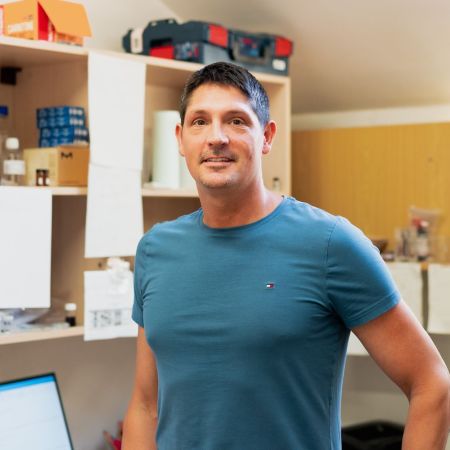
Professor Jakub Siegel came to UCT Prague from the Břeclav grammar school in 2001 and has been working here ever since. He deals with quantum mechanics, and in an interview marking the occasion of his recent appointment as full professor, he also reveals why local park rangers chased him at Mount Vesuvius.
What does your research group do and what is your main goal?
Our research is focused on preparing bactericidal polymer films that can have a wide range of applications. They can be, for example, be used in sensor technology and in biological fields such as tissue engineering (as carriers for the cultivation of various cell types).
How did you get into quantum mechanics and what do you enjoy most about it?
I got into quantum mechanics by means of a big detour. I got my start by focusing on polymer materials, mainly because I was accepted into Professor Švorčík’s research group. The turning point for me was an internship in Linz, Austria, where I met Professor Heinz at Johannes Kepler University’s Institute of Applied Physics. Heinz dealt with laser optics and the interaction of electromagnetic radiation with materials. Based on this, we would modify materials in various ways, and while searching for the causes of the behaviours of the polymers we modified (especially when studying their electrical properties), I slowly began to come into closer contact with quantum theory (at that time, Associate Professor Vladimír Rybka was my great mentor in this area). Subsequently, when our UCT Prague department underwent generational change, it was already decided that I was to start teaching Quantum Mechanics for Materials Engineering. So, in a way, quantum mechanics found me on its own. I started to pay more attention to quantum effects. We started adding nano-structured metals to polymer structures. Metal, when it is specifically dimensionally limited in this way, has unique physico-chemical properties (e.g. optical, mechanical, bactericidal). In general, its reactivity increases, but much depends on specific structures and configurations. The world of small dimensions is simply fascinating, and quantum theory helps us to extract meaningful data from this world with fuzzy contours.
Did you always want to become a professor, or did it just come naturally?
I always knew that if I stayed at university, I had to achieve this imagined goal. If I were in the army, I would want to be a general. I feel a certain need to fulfil my potential. It wasn’t exactly my initial plan, but as soon as I finished my Ph.D., I knew this was where I was headed.
What do you consider to be your greatest professional achievement to date and what motivates you to reach your goals?
Becoming a professor is definitely my greatest achievement. But it is also a big responsibility. It’s one thing to do conduct research and publish, but another to put together a team of people who know what they’re doing. One has to realize that we are the nation that produced Antonín Holý and Otta Wichterle and others who really achieved something in science. Once you join this imaginary club, you are expected to contribute to this tradition in some way.
I find my primary motivation in the privilege of being able to carry out research that doesn’t just get filed away, but contributes to society.
What do you see as the most fundamental difference between before you were a full professor and now?
Being a full professor is mainly about social responsibility. It is a responsibility, and you suddenly have to step out of the inconspicuous grey background and start charting new directions. Our role and purpose is to advance science that is here to make people’s lives better.
Did you lecture more abroad or in the Czech Republic? And why?
Of course, I have international experience, mostly during my studies. I lecture mostly in Czech these days, but on the other hand, I mostly attend international conferences, so I am used to presenting and interacting there in English. In my opinion, lecturing abroad is very important, because it is not only about the content, but also about the form of what specific information you want to convey.
What do you like to do in your spare time?
I really enjoy spending time with my sons and playing sports. I am trying to get my sons excited about sports so that they stay healthy and strong. Personally, I love running, and sometimes it brings with it funny experiences. For example, when I was at a conference in Naples, I woke up one morning and saw Vesuvius from the window. I thought to myself, I could run there. I drove through Pompeii to the last place to park and ran towards the summit with only water in hand. I made it, but the park rangers chased me around the crater because I had run down some path that had been closed for about twenty years. I take running shoes with me to every event and try to combine work with this hobby.

